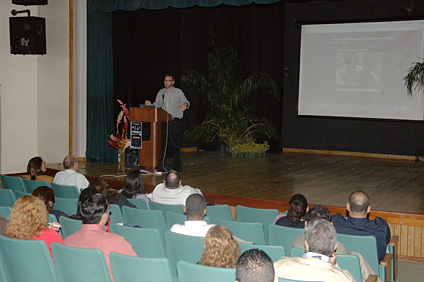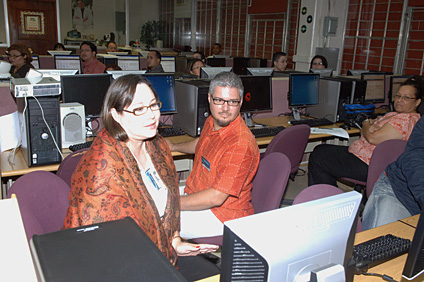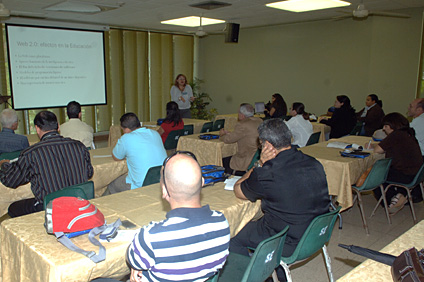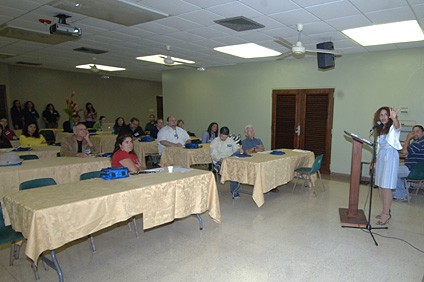|
|
|
Friday, May 29th, 2009 [ versión español ]
Creating a blog, publishing on the internet and managing programs with open content are just some of the diverse concepts that many Puerto Rican educators have already integrated into their teaching processes after having participated in the Blogfesores (Blogfessors) Congress, which for the 3rd occasion was celebrated at the University of Puerto Rico at Mayagüez (UPRM).
The event, organized by the Institute for the Development of Teaching and Learning on Line (IDEAL, by its Spanish acronym), and the UPRM Main Library, revalidated their idea of teaching close to 100 teachers at the intermediate and high school levels, university professors, researchers, librarians, and students on how to utilize learning technologies to make the educational process more effective.
The mission is to provide a space for open dialogue and reflect on the impact of these technologies in educational processes and offer direct experiences with some of these systems. This 3rd Congress focused on the tool Open Access which allows, among other things, obtaining programs without having to pay the high cost that usually goes with them.
“This time the theme moves closer to Open Access, a global movement that is occurring in which materials and tools are being shared. The purpose is to learn about these tools, their availability, how to choose the right ones and how to integrate them to make teaching and learning easier and to make education richer,” explained doctor Cristina Pomales, IDEAL coordinator.
In her judgment, the greatest achievement of this movement is guaranteeing that a larger number of people can count on these programs, whose licenses have costs that make them inaccessible when dealing with closed codes.
“It’s a movement of free and open access, many times for software. Open Access opens the access for everyone that could benefit from it. We are leveling the field, taking the whole world to a base where knowledge is free for everyone,” assured Pomales.
The opening of Blogfessors 2009, which took place this past May 8, 2009, was held in the Ramón Figueroa Chapel Amphitheatre, where those in attendance participated in interactive workshops and conferences throughout the day.
“It seems as if it was yesterday that they did the 1st Congress. When one looks at the development that has taken place in our institutions in regards to this topic we can see that we have been advancing greatly and we have reached many achievements in this area that we didn’t think we would,” commented UPRM chancellor, doctor Jorge I. Vélez Arocho, who took advantage of the occasion to congratulate participants on Teacher’s Day, which coincided with the event.
In her welcoming speech doctor Mildred Chaparro, dean of Academic Affairs, mentioned that the occasion is a way to open doors and explore a necessary and significant world.
“It doesn’t deal with how I teach, but with how my students learn and we owe it to them. We depend on these types of modern tools which are a way to guarantee a student’s individual success,” stated the Dean.
This year, the UPRM Main Library was added to the organizing of the Congress as a way to adjust to the new era of cyberspace and the necessities of its users, as explained by its director, professor Irma Ramírez.
“When Open Access began they said that it would be difficult to accept within the academic community. However, today this forum is being given as an opportunity to see how professors and librarians could collaborate in this effort,” she expressed.
A True Revolution
The keynote speaker at the activity was professor James Groom, Instructional Technology Specialist of the University of Mary Washington in Virginia, who gave the presentation, The Revolution Will be Syndicated.
The presenter began his presentation with a music video created by a cybernaut, who at the same time integrated parts of other videos of open content on You Tube and created an artistic piece. According to Groom, the previous is an example of what can be achieved with these tools that at the same time are a type of historical archive.
“Open content is not about a technology. Open content is not about a site or a right way to do it. Open content is about people opening up, it’s a personal relationship to the web, is a re imagining of ourselves out there,” he explained.
In his presentation Groom used the historical premises of one of the creators of the United States, former President Thomas Jefferson, who said that “every generation needs a revolution.”
Groom classified this era of cyberspace information as the revolution of his generation, in which people reinvent culture. The educator provided examples of blogs or personal publication spaces created by professors and students of University of Mary Washington, which have been successful and have managed to change paradigms.
For the educator, the university should participate in this revolution that allows access to unlimited knowledge without barriers, going beyond the four walls of the classroom.
Some of the workshops offered at the Congress were: Open Content Alternatives for Education in Puerto Rico; Citizen Journalism: Blogs, Discussion Groups and Spaces Open for Creation; Open Access Policy and the Dramatic Growth of Open Access; and A Web of Ideas: How do we Teach with these Tools?, among others.
Video
Verify that your navegator can ejecutate javascript and that has the most recent version of Adobe Flash Player. Dowmload Flash Player

The keynote speaker of Blogfessors 2009 was professor James Groom of the University of Mary Washington in Virginia.

Participants attended interactive workshops and presentations throughout the day.

The event revalidated the idea of education on how to utilize learning technologies to make the educational process more effective.

Doctor Mariam Ludim Rosa Vélez gave a presentation on citizen journalism.
Photographs by Carlos Díaz / UPRM Press
|

